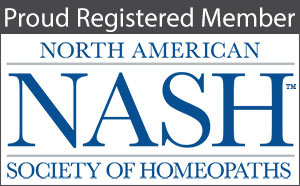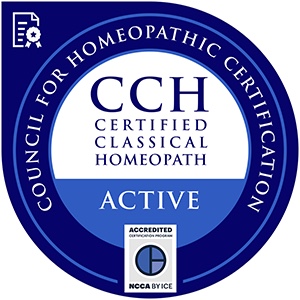What is Homeopathy?
Homeopathy uses safe, nontoxic doses of natural substances to stimulate your body's natural healing ability. When the energy for healing comes from within, you get faster recovery, fewer side effects, a more stable system and better long-term resistance to disease. The goal of homeopathic treatment is always rapid, gentle and permanent healing. Clinics, hospitals and home prescribers the world-round use homeopathy to treat a wide variety of complaints, from epidemic illness to chronic disease. Homeopathic remedies never overpower your body with chemicals or compromise your immune system. The FDA regulates the manufacture of homeopathic remedies. End of comment -----!>
Why Choose Homeopathy?
There is no law, natural or otherwise, that says effective medicine has to be dangerous. It must simply be able to exert an effect on the body. If medicine is applied correctly, this principle can prompt the body to do its own healing, which lasts longer than relying on chemicals to suppress symptoms. Homeopaths match all the symptoms of the disease to one remedial substance, and give that substance in a dose just big enough to get a response. The homeopathic remedy asks your body to do things just a little bit differently. As your system moves toward more stability and resilience, overall health improves. Simply improving your general health can often be enough to address long-standing issues like chronic inflammation, overreactions to the environment (allergies), sleep and mood disorders, low energy, painful menstrual cycles ... (the list of ailments your body can maintain through poor functioning goes on and on). In acute complaints like colds and flus and injuries, a homeopathic remedy can help the body to find the quickest and most effective way to bounce back.
Does medical insurance cover homeopathy?
The short answer is that, No, insurance companies in the U.S. do not cover homeopathic treatment, so we here at Dynamis cannot take insurance. Wouldn't it be great if medical insurance companies covered all the unconventional forms of healthcare that could prevent you needing to make expensive hospital visits? Fortunately, they do cover some of those, like acupuncture and chiropractic. Unfortunately, however, they don't cover homeopathy, which is one of the most powerful of the alternative approaches. Although we might be tempted to blame insurance companies, this is also because homeopathy is not a licensed medical practice in most places in the U.S. It certainly isn't licensed in North Carolina, and the combination of company requirements and state medical law make it impossible for us to file claims for clients. Even though this situation is not of our making, we do regret that it makes homeopathy difficult for some people to afford. Keeping this always in mind, we strive to provide the sort of high quality care that our clients will find worth the expense!
When should I consider seeing a homeopathist?
When you are looking for a safe, natural way to keep your family healthy. When you suffer from a chronic condition for which conventional treatment promises no improvement, only permanent drug therapy and a slower decline in health. When the doctor says you are fine even though you do not feel well. When you have strong reactions to conventional drugs. When you are looking for a gentle, holistic approach to long-term health. When you would like to recover a sense of well being. One of the great strengths of homeopathy is that it can help when you just do not feel well. Many people suffer from depression, anxiety, low energy, muscle and joint pains, poor sleep, various allergic sensitivities and other vague complaints for which conventional medicine has only long-term drug therapy. Homeopathy is able to heal and strengthen long before things deteriorate to the point of needing interventions like strong drugs or surgery. Homeopathy is also quite effective alongside conventional treatments.
Can homeopathy treat my disease?
People who are used to conventional medical treatment, especially people who have received a serious diagnosis, naturally want to know, "Can homeopathy help my medical condition?" The universal answer is this: If your body is strong enough to respond to a remedy, then homeopathy can help you. In the holistic view of illness, disease affects the entire organism. Symptoms that occur in various parts of the body are related to this system-wide disturbance. Just as serious systemic illnesses like lupus come with skin symptoms, so skin complaints like eczema are also associated with deeper health problems. Homeopathic treatment, then, aims to address this system-wide disturbance, improving the person's overall health and allowing the body to heal the physical complaints on its own. The goal of homeopathy is to make you stronger so that your body can heal itself. This holistic approach makes homeopathy useful anytime your health is less than optimal.
How do I schedule an appointment?
You may schedule an appointment at Dynamis Homeopathy by calling the office (919.286.7626) or by using our online scheduler. If you are new to the practice, choose the Intake appointment and the system will make sure you get the right paperwork. If you are scheduling a new client appointment online, expect to receive a phone call from the homeopathist within the week. He will confirm the time you have chosen, answer any questions you may have and ask for additional information if necessary. Regardless of whether you schedule online or by phone, you will then get an email with a link to your client portal. Following the link will take you to our consent forms and a homeopathic questionnaire. The consent forms are quick and easy. Just read through and sign your consent at the bottom. All appointments with Dynamis Homeopathy in 2024 will be virtual (videoconference).
What is the homeopathic questionnaire?
Once you have scheduled an appointment, our system will send you an email link to your client portal, where you can fill out our consent forms and the homeopathic questionnaire. The homeopathic questionnaire is an in-depth review of your medical history, your family medical history, your current drugs and how you and your body get along with your environment. The questionnaire will take the average person 20-30 minutes to complete. If you have a very extensive medical history, it make take twice as long. The client portal also takes uploads, so you can send medical documents if that will save you time typing in a medical history. Filling out the homeopathic questionnaire, you may notice questions that have little to do with the reason for your visit. Because homeopathy is an holistic approach to health, seemingly peripheral issues, like the quality of your sleep or foods you crave, may give us valuable clues for choosing the right homeopathic remedy. Thinking about such questions ahead of time will also prepare you for some of the things we'll be discussing during your appointment.
How long will my appointment take?
Usually, an acute appointment will last no longer than 20 minutes. With a truly acute complaint (something you caught), symptoms tend to be strong and easily described, and the homeopathist only needs to know what ails you, where it ails you, what makes your ailing feel worse, what makes your ailing feel better and any unusual things that happen at the same time that you’re ailing. Appointments for long-standing or complicated health problems last 2 hours. Besides the information above, the homeopathist will want to understand in more depth how you experience your health complaints. He will also want to know what other health complaints you have or have had, and he will want to understand how your body functions generally.
What should I expect on the day of my appointment?
All appointments are by videoconference. You will receive an email 10 minutes before your appointment time with a link to the video call. If you're on a computer, simply click that link to be taken to your browser. If you're on a phone or tablet, clicking the link will download the Simple Practice Telehealth app, which should take no more than 2 minutes to download and start. If you have difficulties, simply call the office number: (919) 286-7626.
What happens after my appointment?
After your intake appointment, the homeopathist will recommend one homeopathic remedy to address your complaints. Your remedy is always included with your appointment if you get it from us. Because it’s a conflict of interest to prescribe things that we charge money for, we always provide remedies at no cost. We do have to charge for shipping, but the remedies themselves are free. If you are doing an initial appointment, the shipping to send you your first remedy is also free. After the first remedy, shipping costs $10 each time we send you a new remedy. Full instructions for taking the remedy will be included in your shipment. A bottle of remedy will usually last 2-5 months.
How do I report my progress?
We schedule follow up appointments at intervals that will be most useful for assessing your progress without wasting time. Once you start a homeopathic remedy, we expect to have you back for your first followup after 2-6 weeks, depending on the nature of your health problems. If you have important information to share in between appointments, you may simply call or sms text or email the office. There is also a secure messaging feature included in your client portal. Follow up appointments are scheduled for 20 minutes. And as soon as you begin responding well to a remedy, we can lengthen the intervals between follow up appointments.




